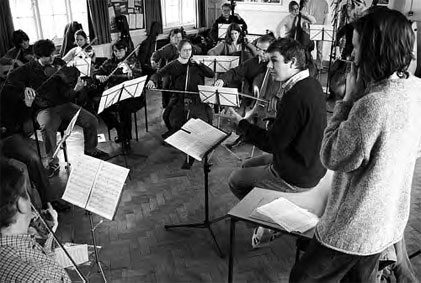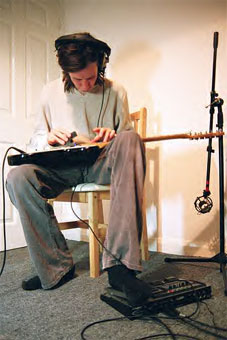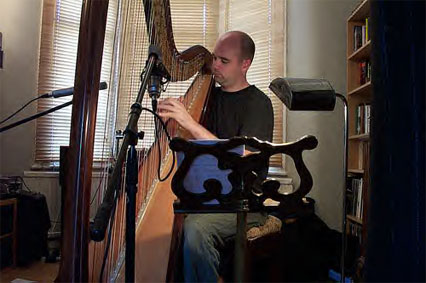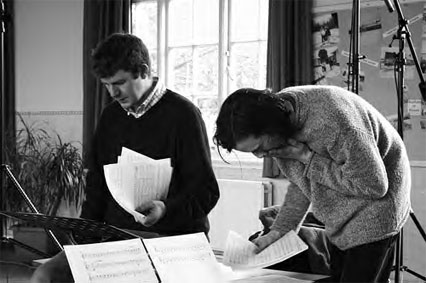
A Prelude to Distraction [2006-05-24]Cambridge based Ryan Teague is part of new wave of young contemporary composers who are breathing new life into UK electro-acoustic and experimental music. Teague has with his debut record Six preludes, displayed a harmonic and soulful approach that is far removed from the clinical styles of Stockhausen and Xenakis or the overt minimalism of Bryars or Reich. His melting pot of influences and his determination to produce music that touches the heart as much as the head has made him one to watch for 2006. Here I find him preparing for the immanent release of his full length album Coins and Crosses, a record that will no doubt propel him to a wider audience. m[m] I first came across your music being played over the PA in a record store in Paris, I inquired as to it‘s origin and I was led to your Six Preludes record. What first struck me was something in the tones and textures that seemed to go beyond the usual academic or overtly clinical style of electro-acoustic composition, perhaps for want of a better expression "more soulful". Was it always your intention to create music that stimulated the heart as well as the head? 
RT. It was my aim from the outset to prioritise a more aesthetic approach to my compositional style. I have little interest in clinical, academic or technical approaches to composition whatsoever. I believe my music already fits awkwardly under the traditional notion of the term ‘electro-acoustic’ composition owing to fundamental differences in both the substance and structure of its makeup. My interests lie more specifically in successfully amalgamating a broad variety of sonic material that results in a total blurring of the elements that make up the whole. So my approach and treatment of the source material, be it instrumental, synthesised or concrete in origin, is ultimately the same. It is entirely natural for me to ignore distinctions between sounds, styles and techniques. That my music is perhaps stimulating on a more emotive level is possibly the result of a conscious decision to develop the rich harmonic and complex textural elements that begin to emerge through this process, combined with an increasingly ‘tonal’ approach to my use of harmony. My working methods often involve listening acutely to particular sounds, and enhancing elements that occur naturally within, or at least appear to. I may do this by augmenting a particular acoustic sound source with a very similar electronic sound that highlights the natural overtones within, yet ultimately I will aim to create a perfectly natural sounding union between these sounds. m[m] That sounds quite like the approach Stockhausen took with Gesang der juenglinge. Augmenting the boy choirs voice with electronic overtones that mesh and blend with the timbres of the voice. Have you studied any of Stockhausens ideas on electronic music or other "contemporary masters" like Cage, Xenakis, Varese? RT. Of course, I have had a keen interest in these composers throughout my development, but they are not necessarily the direct source of my inspiration. I would however certainly draw parallels between Stockhausens treatment of sounds and my own, particularly with reference to ‘Stimmung’ and his use of overtones. This particular concept and subsequent approach to his use of the voice are of great interest to me, and representative of my own aspirations. This concept also arguably triggered a new genre in orchestral music in the form of the Spectralists, which I find very exciting. With regards to Cage, I have certainly read more about him than I have listened to, and I believe my approach is fundamentally different from his own. Cage in fact condemned Varese’s use of electronics as too contrived, and that he had a tendency of ‘bending sounds to his will’ that Cage found restrictive. In Cage’s eyes I would certainly be guilty of the same treatment! Where Cage was seeking to represent, that is, to ‘re-present’ sounds in their humblest form, I seek to sculpt and enhance them into a musical form. My own difficulty with Varese’s use of electronics is that it was often treated as more of a novelty than a fully integrated component of the music, which has subsequently left it with a very ‘dated’ quality.  Here however, lies the ultimate taboo of electronic music, that is, the ageing of sounds over time and the fashions and fads of technology. Such instruments as the Ondes Martenot, the Theremin, even the Moog, have already been consigned to the history books. It is a lesson that we need to be conscious of given the rapid developments in modern synthesis. Subsequently, I am becoming increasingly aware of the need to treat acoustic material as the primary source of my own music. Here however, lies the ultimate taboo of electronic music, that is, the ageing of sounds over time and the fashions and fads of technology. Such instruments as the Ondes Martenot, the Theremin, even the Moog, have already been consigned to the history books. It is a lesson that we need to be conscious of given the rapid developments in modern synthesis. Subsequently, I am becoming increasingly aware of the need to treat acoustic material as the primary source of my own music.
m[m] Was there any special reason you titled your record Six Preludes? And if those songs are just preludes what do you intend for the main act? RT. As well as being defined as an introductory movement or opening section, the term ‘Prelude’ can also refer to a selection of pieces based around a specific theme. This is exactly what Six Preludes aims to represent. They are themed works based around an open-ended compositional framework that enabled me to develop this notion of electro-acoustic music as I saw it. During the conception of Six Preludes, I was certainly aware that this was only the beginning of a particular musical journey, and more specific ideas seemed too ambitious to achieve in this first instalment. It was a way of defining my intentions, whilst setting out objectives for my development. m[m] There is a wide variety of styles and techniques used on Six Preludes, beyond the classical composition I could detect elements of musique concrete, soundtracks and even some passages that had elements of minimal industrial. Resulting with such a heady melting pot what/who were your influence for Six Preludes and your music in general? RT. Prior to beginning Six Preludes, I had spent a considerable amount of time listening to, and researching music that I felt would enable me to realise my own very specific ideas about electro-acoustic composition. I had a strong mental idea about how I wanted this music to sound for some time but it took a long time to actually establish that voice, and of course I still am. But there were very particular qualities that I was seeking to interject into my music and it was through listening to the likes of Coil, Alice Coltrane and John Adams that I began to understand such methods that I could effectively incorporate into my own music. My wider influences stem back largely to Progressive Rock bands, notably Yes and Pink Floyd, which soon led me onto Jazz Fusion and the likes of The Mahavishnu Orchestra and Miles Davis. Throughout this time I was also listening to a lot of ambient-dance music and electronica, particularly The Orb and The Future Sound Of London, which later led onto a keen appreciation of Drum and Bass. Subsequently I developed a fascination with industrial music and the likes of Throbbing Gristle and Coil. Nephesch on my forthcoming release is a personal dedication to the late Jhon Balance of Coil who was a great loss to contemporary music. I started seriously listening to orchestral music at the age of 18 when I was introduced to Gorecki’s Symphony No. 3 which was a fairly apt starting point! This quickly led to important discoveries by composers such as Stravinsky, Webern and Ligeti, as well as John Adams and the Minimalist school. I think I can safely say that John Adams’ Shaker Loops is perhaps the Holy Grail of my musical inspiration in that it encapsulates so many of the qualities that I aspire to in my own music. Much of this music also embodies a reflective, austere and often spiritual dimension that is very important to me, and it is something I actively aim to incorporate into my own music and philosophy. m[m] Can you tell us about your forthcoming full length album, how does it compare to Six Preludes RT. Coins and Crosses has been a long time in the making. I’ve spent close to two years working on it and it has gone through some substantial changes in that time. After completing Six Preludes I put a lot of thought into my intentions for a full-length album. I actually began by mapping out a format for the overall structure of the album and even particular ideas for themes and titles. In this sense I was almost trying to establish a conceptual theme that would run throughout the album prior to actually starting it. In the early stages of actually composing I think I wandered quite far from these ideas and became disillusioned with the results. The pieces often veered in a darker direction that frequently sounded melodramatic or unnecessarily complicated. I subsequently made a conscious decision to introduce a more positive and affirming aspect into my music that began to shift it in a more appropriate direction. The album on the whole is a much more personal and reflective work than Six Preludes. I think it also references more specific musical concepts that may be harder for some people to grasp, particularly a strong thread of traditional music that runs throughout that ultimately distinguishes it from the more contemporary styling of Six Preludes. These references particular relate to early sacred music, the likes of Perotin, Dowland and Early Church Music, and these ideas are also reflected in my choice of instruments on the album, notably Harp, Voice, Strings and Drones. Subsequently the album has a strong meditative and often transcendental quality to it. 
I have also become increasingly occupied with writing for strings, and as a result it became necessary to employ a String Orchestra for the album. We had looked at various options, but owing to inevitable budget restrictions, settled for working with a local amateur orchestra. There are a lot of Orchestras in Cambridge where I live, but in the end we opted for The Cambridge Philharmonic Orchestra conducted by Tim Redmond who was very open to the project idea. It was a huge learning experience for me, and very inspiring. However, I still feel I’m a long way from realising more ambitious ideas about electro-acoustic composition. m[m] Do you find composing works for large Orchestras more satisfying than smaller scale or un-scored works? RT. At the moment I am certainly enjoying learning how to write for larger ensembles. This really is a new process for me, and I see my current works as a reflection of this course of development. I think the two works on Coins and Crosses that are scored for String Orchestra alone are essentially studies, and an exploration of new methods, techniques and processes that I find very exciting. And whilst I am always seeking to learn new musical languages, there is still an element that I am merely ‘gathering’ ideas for more ambitious projects that aim to incorporate this range of approaches. m[m] With the advent of so much new technology in music that can synthesize and reproduce sounds from string quartets to bird song, do you think that the place for Orchestras in contemporary music is beginning to shift? And where do you think it will fit in, in say 20 years time? RT. I don’t think the place of Orchestras in contemporary music will shift per se, that is, I certainly don’t think they need to be worried that there is any danger of being replaced by machines! Much of the supposed ‘progress’ in modern synthesis and sampling packages is placing too much emphasis on hyper-real preset/factory sounds, which invariably suffer from a Warhol-like canned quality. These sounds are not fit for longevity in music and it is only through the infinite complexities of acoustic/concrete sources that we can begin to hope for music that retains a more timeless quality. In 20 years time, I’m not sure we will see any difference. The modern orchestra and its components have evolved out of the necessity for particular tonal and dynamic needs, and whilst not perfect, this range of timbres are still an excellent basis for solid composition. m[m] The title of your forthcoming full length record is Coins and Crosses. This conjures up images of spirituality, religion, or even alchemy. John Cage was immensely influenced by his beliefs in Zen and eastern philosophy’s. Do these issues play an important role in your life and how do you feel they have influenced your music? RT. The title very specifically aims to evoke such imagery. It’s actually a quote from a lyric by Jon Anderson, and I chose it because it seemed very fitting and complimentary to the themes I had chosen in the musical material. I certainly have a keen interest in spiritual philosophy, but I am at the same time quite opposed to dogmatic, religious convictions. These issues have fed into my recent work inasmuch as they are important to my development personally. Therefore, it is vitally important that my music is a reflection of this journey, and my inspirations have included the writings of Aleister Crowley, Swami Vivekananda, and Paramhansa Yogananda. I am however a mere beginner! Equally I am interested in how musicians have incorporated these sacred and spiritual qualities into their own work throughout the ages, be it the tranquil simplicity of Gregorian chant, the cosmic invocations of Yes, or the occult processes of Coil’s lurid soundscapes. Music is ultimately a space to create our own sense of harmony. m[m] You have mentioned Coil a few times and you say the writings of Crowley were an influence. Have you considered composing darker works, more in an industrial or overtly occult style. Maybe an opportunity for a side project? RT. It’s interesting, but I think there is an assumption that an interest in ‘the occult’ invariably leads to ‘dark’ interpretations of it in any art form. My own understanding of such work and its processes however, are that it is ultimately for the attainment of a positive force, and it is this philosophy that I have tried to actively incorporate into my own music. That’s certainly not to say that the music cannot embody a quintessentially melancholic core, but my own experiences of music as a therapeutic process are that it can be a very affirmative experience. Above all I don’t think I have time for any side projects! m[m] The artwork for Six preludes is quite stark and abstract. The preview of the cover for Coins and crosses seems to follow in a similar vein. Do these images have a special meaning to you? Do you try to combine the visual presentation of your records to the sonic landscape within? RT. Naturally it is very important to relate the visual presentation to the music, and it is always quite a challenge in doing so. I actually studied a degree in Fine Art myself, and Type Records are a very visually orientated label, so it is only natural that we should choose to make strong visual statements. Interestingly, the images on both of the releases are abstract details of ‘concrete’ things, that is, there is no digital manipulation of the raw materials and I think about my music in very similar ways. It is more a case of focusing acutely on specific elements of the image or sound, and exploiting its innate abstract qualities whilst still allowing it to retain the essence of its original form. 
m[m] I have read that you have performed some live shows of your music. What form do these shows take? How well do you feel you can integrate the electronic and classical aspects of your sound into the live setting? RT. This is the ultimate challenge, and the ultimate question! At present I am envisaging two quite different formats for live performance. The first is a smaller scale, semi-improvised project that we can take around relatively easily which will most likely consist of myself on Laptop, a Harpist, a Cellist, a Violinist and a Marimba player. The players I have lined up are very strong musicians, and the set will basically revolve around specific predefined themes that we will be able to improvise around. I imagine this music to be very dynamic and bold, and an engaging live experience. As to the question of successfully integrating these apparently disparate practices in a live setting, it is certainly a challenge. I have seldom seen this done effectively, and that is not even to speak of the technical difficulties involved. I do however believe this is the ultimate challenge in the emerging scene of live electronic music, and there are certainly some incredibly ambitious and innovative groups beginning to emerge that are establishing a truly unique and original live presentation. The difficulty is partly a technological one, in that the levels of control now attainable in the studio are unparalleled, and translating this flexibility and precision into a spontaneous live setting is much harder. I am subsequently very aware of the tendency to over-control the elements and turn it into a very clinical affair. However, it is ultimately my aim to strike a fine balance between the structural and compositional possibilities afforded by live musicians, with the more spontaneous, experimental and textural elements of electronic treatments. m[m] Are you planning any shows or tour to coincide with the release of coins and crosses, any trips to London? RT. Our plan at this stage is to organise a series of shows to coincide with the launch of the album in Autumn 2006. On the other hand, we are currently in the process of working out the possibilities and logistics of a larger scale tour with a string orchestra, but this will largely depend on obtaining suitable funding. This will be a considerably more ambitious affair, and will involve interpreting specific pieces from my releases, as well as some pieces written specifically for the event. m[m] Where do you see yourself in 10 years time musically. Does the relentless pace of technological change make long term plans difficult, even irrelevant? RT. Well, as I hinted at before, I do not consider myself to be a slave to the advances of technology, in fact far from it, and I certainly don’t think it determines my approach to composition. The fundamental basis of my music is always a strong (yet often simple) harmonic, melodic or textural basis. As a result of this, these elements can be arranged and adapted to suit a range of instruments, and subsequently can be performed accordingly. Consequently, when I think about my aspirations for composition, I cannot foresee a situation where I cannot achieve a particular idea, because my approach to the electronic elements are always secondary. I think it is dangerous and not particularly fruitful to rely so heavily on a technological approach to music, because the tendency is to shut oneself off to ideas based on what is achievable by the current means. Ryan Teagues EP Six Preludes is out now on Type Records. His full length album Coins and Crosses is due out on Type records in the Autumn. http://www.ryanteague.com/ Duncan Simpson
| 
